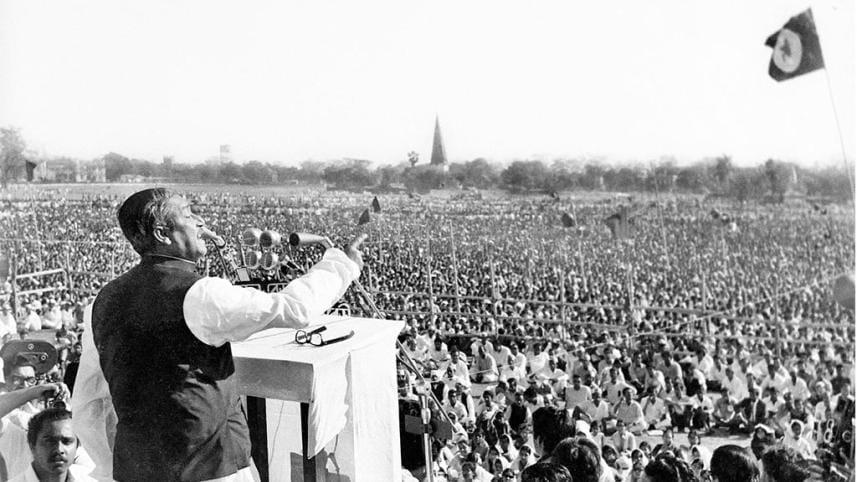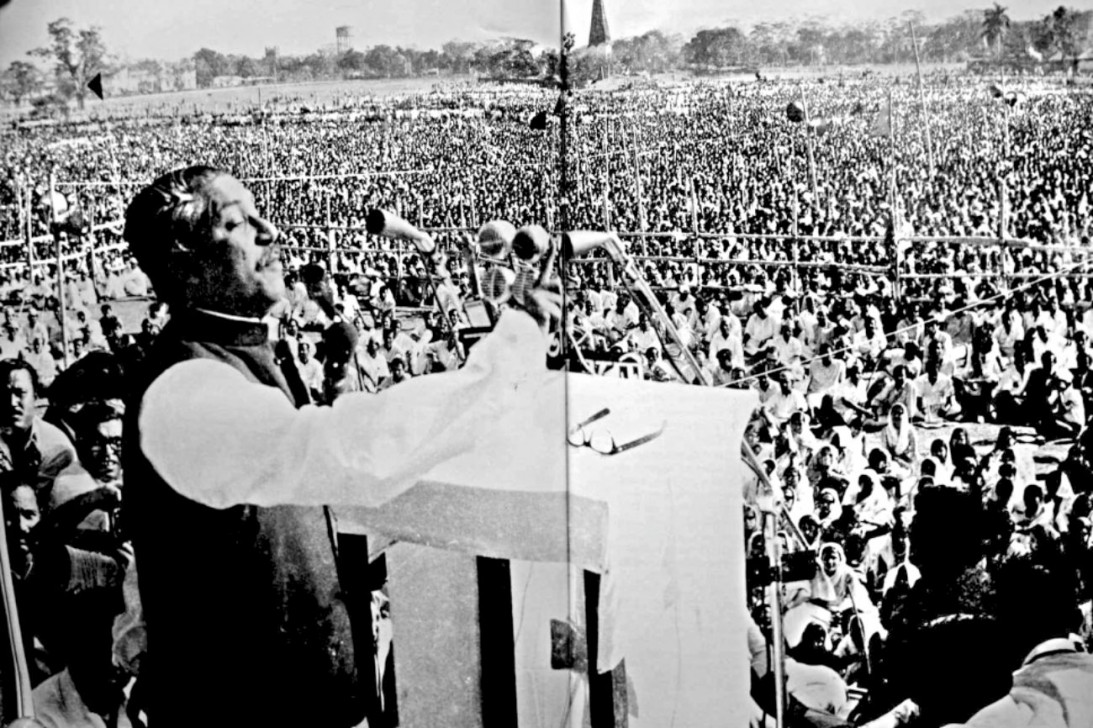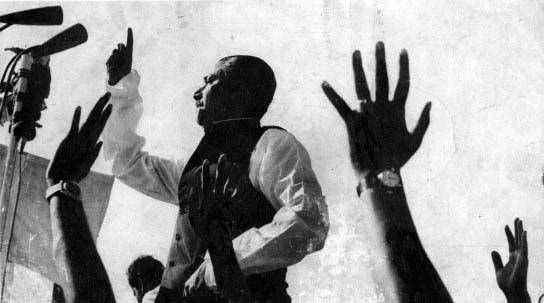A speech to stir 75 million souls

More than anyone else in Bangladesh's history, Bangabandhu Sheikh Mujibur Rahman enjoyed a relationship with his people. That special relationship reached its zenith at the Racecourse Maidan on March 7, 1971.
That year, 1971, as we all know by now, threw up a number of dates that will remain forever etched in the history of Bangladesh, and command its people's reverence. Particularly, March 26 and December 16, commemorated respectively as the days of Independence and Victory, stand out in the popular consciousness, constitutionally enshrined as indelible landmarks in the country's emergence. They are marked on every calendar and appear on the "important dates" column of every diary, not to mention the annual holiday sheet. Yet, there are many—or at least maybe the one million or so who made their way to the Racecourse Maidan on March 7 that year—who, when thinking back, will find it hard to name any other day, or date, or moment, that can take that afternoon's place as the pinnacle of Bangladeshi nationalism.
I mentioned the million-or-so who came. They came, on that soggy March afternoon, from all corners of the country. And having arrived, spread out again, away from the rudimentary stage that had been erected in vast concentric circles, till as far as the eye could see. I weigh those words today, 53 years later, and almost shudder at how literally I mean it. It so poignantly contrasts the countless number of times one may utter the same words, with such casual disregard for their meaning. No, here were gathered one million human beings, and their pulse beat as one. Being the great, natural leader of men that he was, Sheikh Mujib—Bangabandhu after all, with all the instinct for his people's feelings implied by that name—captured it in an instant, and in maybe 15-20 minutes, delivered it back with such authority and conviction, the truth of his words stinging the air. It is inconceivable to have been there and not come away from it completely convinced of his leadership. That day, he could have said we'd go for parting the sea, and we would have taken turns carrying the staff with which he'd do it.
In light of the unsavoury nature of all the politicking in recent times, I've been recalling his leadership, that particular relationship with his people that Bangabandhu Sheikh Mujibur Rahman enjoyed, that has never quite been reproduced since on these shores. The people in Bengal started making a friend, at least his acquaintance, as he made his way around the rural heartland in the east on his bicycle, many a year before he became Bangabandhu. They called him Mujibur, a staid spelling that rendered it almost a different name to the endearing call of "Mojibor," which is how they started coming to know this fellow, wiry and bespectacled, with a sincere face that encouraged people to talk to him. Just around the time, Suhrawardy spotted his strength as a trusted organiser of the people. That's when Mujib started a lifelong conversation with the people he left as Bangladeshis at his death. A leader so in tune with the ebb and flow of his people's feelings can never betray that privilege. Only a leader like him could speak his nation's mind, as he did on March 7, 1971.
Here were gathered one million human beings, and their pulse beat as one. Being the great, natural leader of men that he was, Sheikh Mujib—Bangabandhu after all, with all the instinct for his people's feelings implied by that name—captured it in an instant, and in maybe 15-20 minutes, delivered it back with such authority and conviction, the truth of his words stinging the air. It is inconceivable to have been there and not come away from it completely convinced of his leadership. That day, he could have said we'd go for parting the sea, and we would have taken turns carrying the staff with which he'd do it.
I had made my way there with my friend, the dearly departed Mishuk Munier, and his brilliant father, Professor Munier Chowdhury, the martyred intellectual, who were our neighbours on the DU campus. I clearly recall how we milled about on the great expanse of the Maidan like ants, the day's din a cacophony of speculation as to what was to come. Would we hear a categorical declaration? Were the Six Points to stand? What about the violence that had gripped the country in the preceding week, with the military effectively deployed?
To have been there was to have lived a bit of Liberation. Bangabandhu took the stage, and instantly everyone in every corner sat (or stood) transfixed, hanging on every word that poured out of his soul in all directions, washing over this great sea of humanity that had seemingly obliterated the green of the Maidan. He spoke to his people (After "I come to you with a heavy heart," "You know everything, and you understand everything"). He spoke of them, their miseries, the injustice and cruelty to which they were subjected ("The weapons I paid for to defend the nation, are today turned against my own people" and "How my mothers have been made sonless"). He trusted them ("Bangaleera, act using your judgement!"). He confided ("I speak to Yahya Khan on the telephone"). And assuredly, with the cacophony building up, he spoke by them, and they spoke by him.
The honesty in the relationship can be told by how twice—or maybe more, but twice that I recall—he very pointedly broke his chain of thought to remind us all that his fate was uncertain, and so to continue their struggle still ("Even if I'm not there to command you!"). This was, after all, this time around, "the struggle for independence."
Enayetullah Khan is editor-in-chief of UNB and Dhaka Courier.
Views expressed in this article are the author's own.
Follow The Daily Star Opinion on Facebook for the latest opinions, commentaries and analyses by experts and professionals. To contribute your article or letter to The Daily Star Opinion, see our guidelines for submission.




 For all latest news, follow The Daily Star's Google News channel.
For all latest news, follow The Daily Star's Google News channel. 

Comments